Business Ethics and Uber: Stakeholder Impact and Ethical Theories
VerifiedAdded on 2023/01/11
|11
|3455
|64
Report
AI Summary
This report provides a comprehensive analysis of Uber's business ethics, focusing on ethical issues, corporate social responsibility (CSR), and the impact on stakeholders. It begins with an executive summary highlighting the importance of ethical practices for Uber's long-term growth and customer satisfaction. The report then delves into specific ethical issues, such as the sexual harassment allegations and the "Greyball" software scandal, detailing Uber's responses and the subsequent consequences. It explores CSR through Carroll's pyramid, examining Uber's economic, legal, ethical, and philanthropic responsibilities, and highlights its various CSR initiatives. Furthermore, the report discusses relevant business ethics theories like normative and descriptive ethics, including deontology, virtue ethics, ethical egoism, utilitarianism, and the influence of individual and situational factors. Finally, it examines the impact of both ethical and unethical practices on internal and external stakeholders, including customers, employees, suppliers, investors, and shareholders. The report concludes by emphasizing the need for Uber to prioritize ethical conduct to regain market share and maintain a positive brand image.
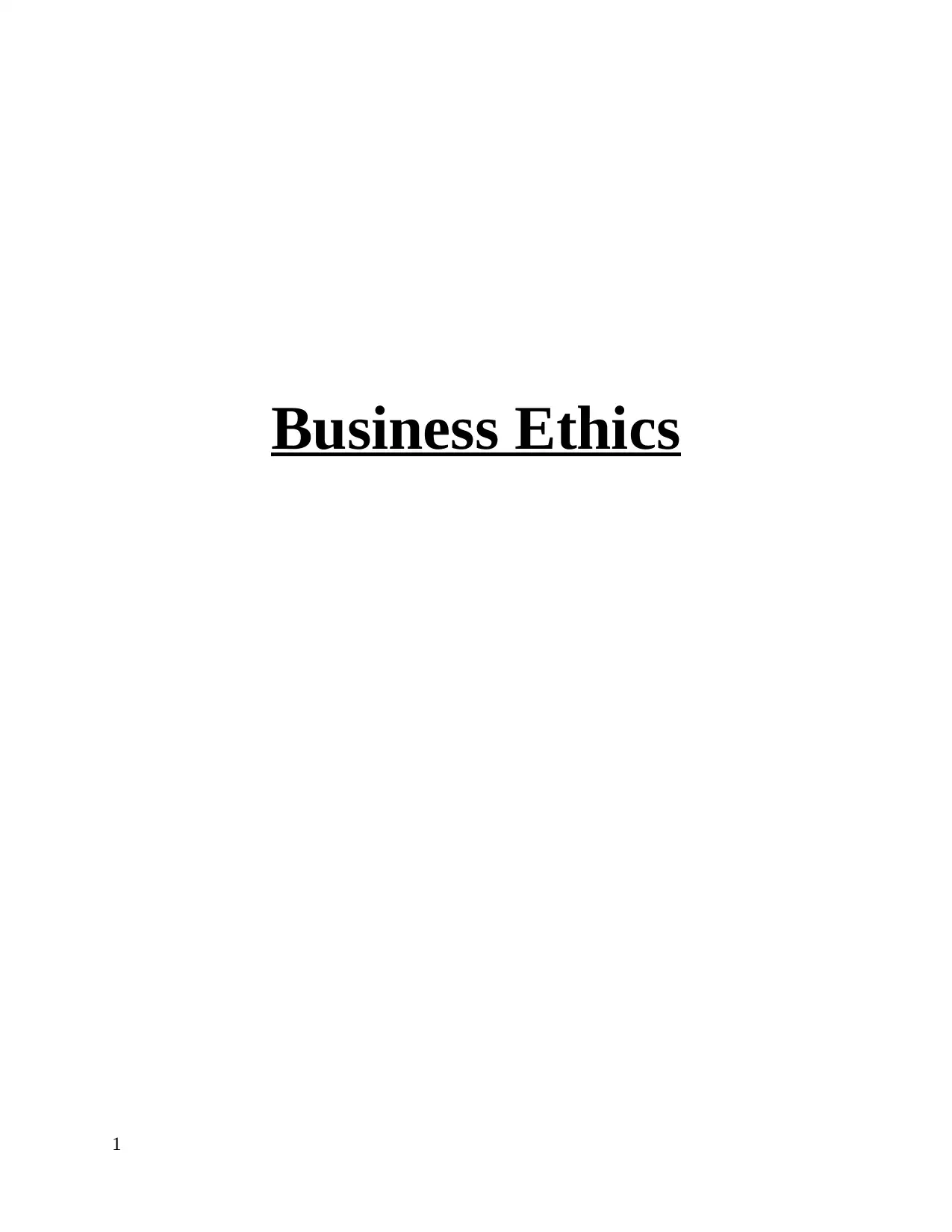
Business Ethics
1
1
Paraphrase This Document
Need a fresh take? Get an instant paraphrase of this document with our AI Paraphraser
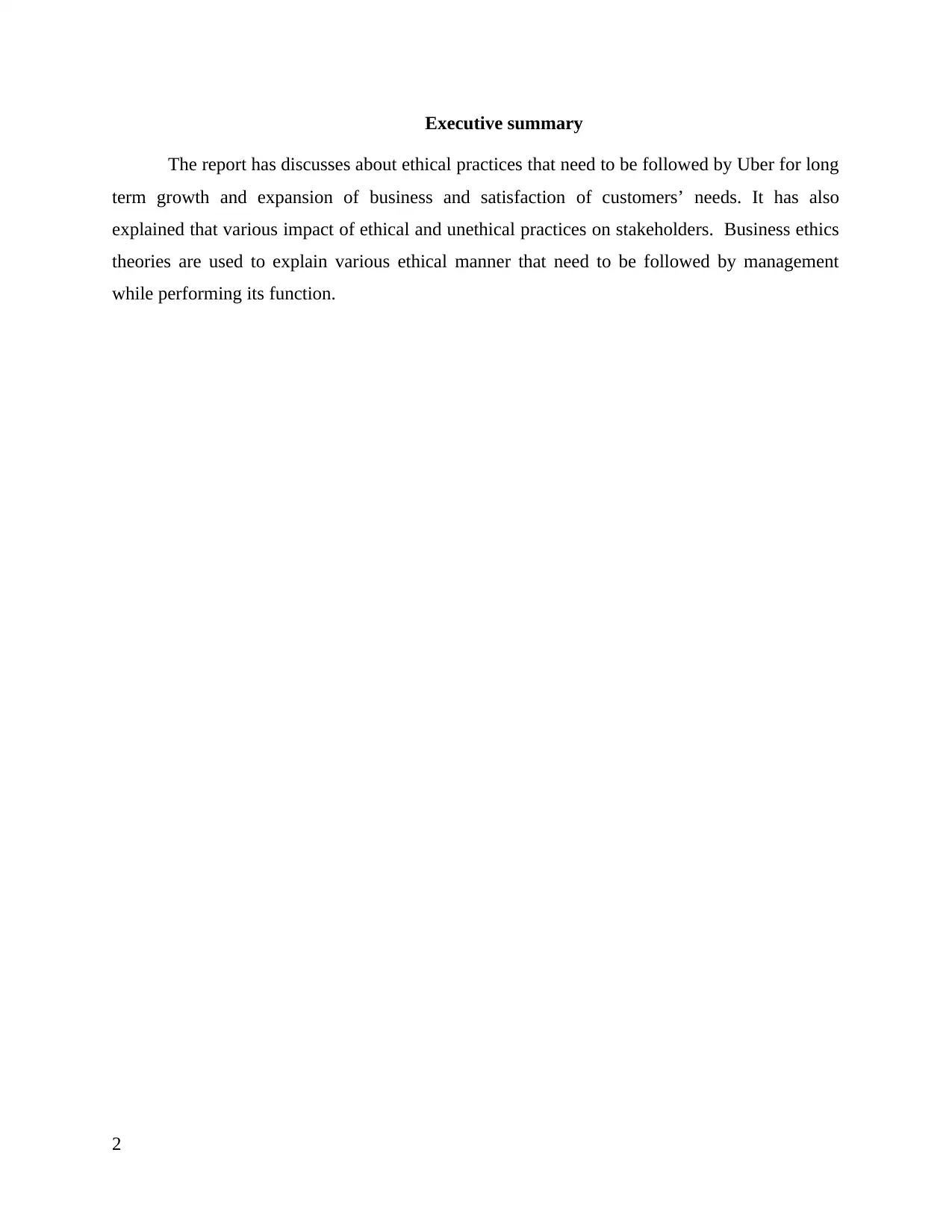
Executive summary
The report has discusses about ethical practices that need to be followed by Uber for long
term growth and expansion of business and satisfaction of customers’ needs. It has also
explained that various impact of ethical and unethical practices on stakeholders. Business ethics
theories are used to explain various ethical manner that need to be followed by management
while performing its function.
2
The report has discusses about ethical practices that need to be followed by Uber for long
term growth and expansion of business and satisfaction of customers’ needs. It has also
explained that various impact of ethical and unethical practices on stakeholders. Business ethics
theories are used to explain various ethical manner that need to be followed by management
while performing its function.
2
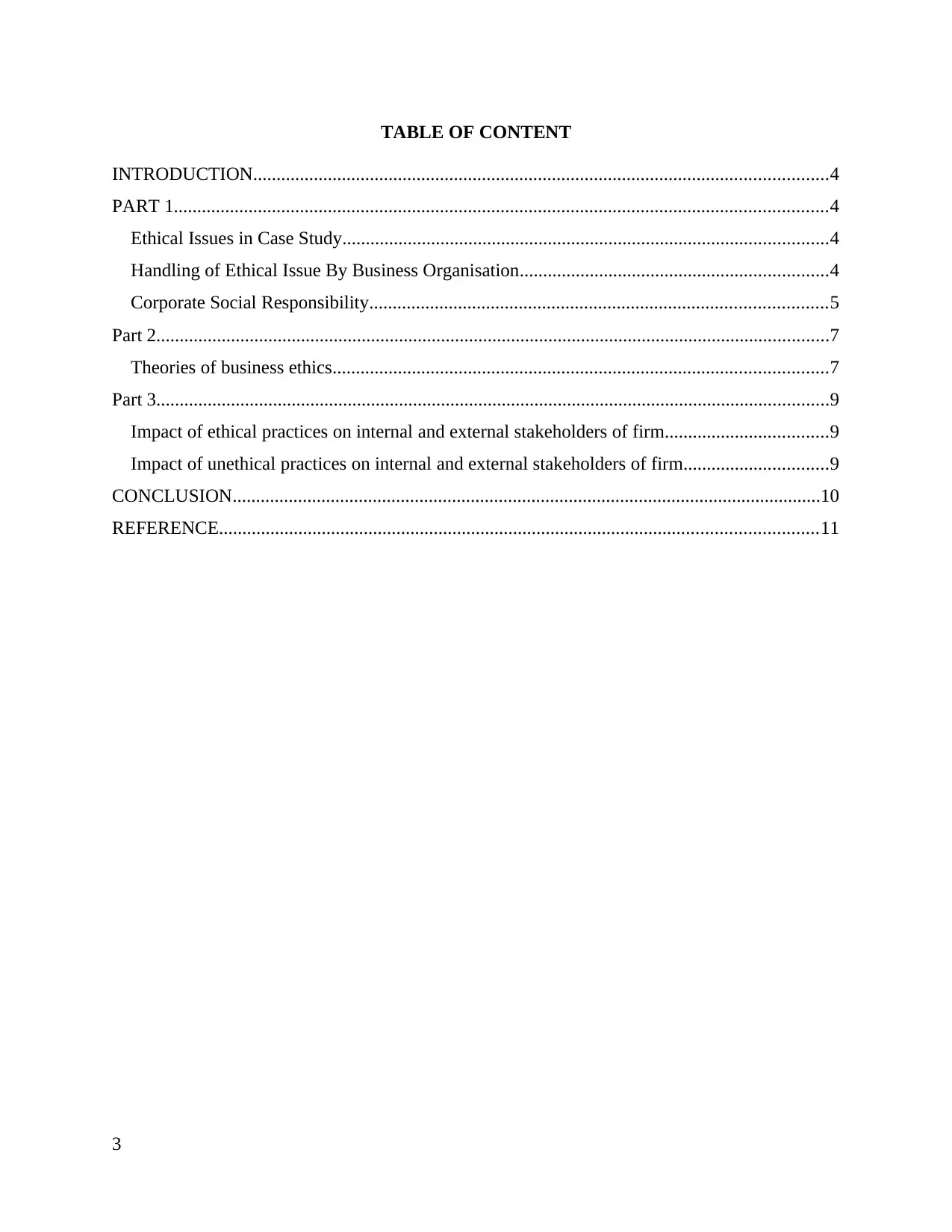
TABLE OF CONTENT
INTRODUCTION...........................................................................................................................4
PART 1............................................................................................................................................4
Ethical Issues in Case Study........................................................................................................4
Handling of Ethical Issue By Business Organisation..................................................................4
Corporate Social Responsibility..................................................................................................5
Part 2................................................................................................................................................7
Theories of business ethics..........................................................................................................7
Part 3................................................................................................................................................9
Impact of ethical practices on internal and external stakeholders of firm...................................9
Impact of unethical practices on internal and external stakeholders of firm...............................9
CONCLUSION..............................................................................................................................10
REFERENCE................................................................................................................................11
3
INTRODUCTION...........................................................................................................................4
PART 1............................................................................................................................................4
Ethical Issues in Case Study........................................................................................................4
Handling of Ethical Issue By Business Organisation..................................................................4
Corporate Social Responsibility..................................................................................................5
Part 2................................................................................................................................................7
Theories of business ethics..........................................................................................................7
Part 3................................................................................................................................................9
Impact of ethical practices on internal and external stakeholders of firm...................................9
Impact of unethical practices on internal and external stakeholders of firm...............................9
CONCLUSION..............................................................................................................................10
REFERENCE................................................................................................................................11
3
⊘ This is a preview!⊘
Do you want full access?
Subscribe today to unlock all pages.

Trusted by 1+ million students worldwide
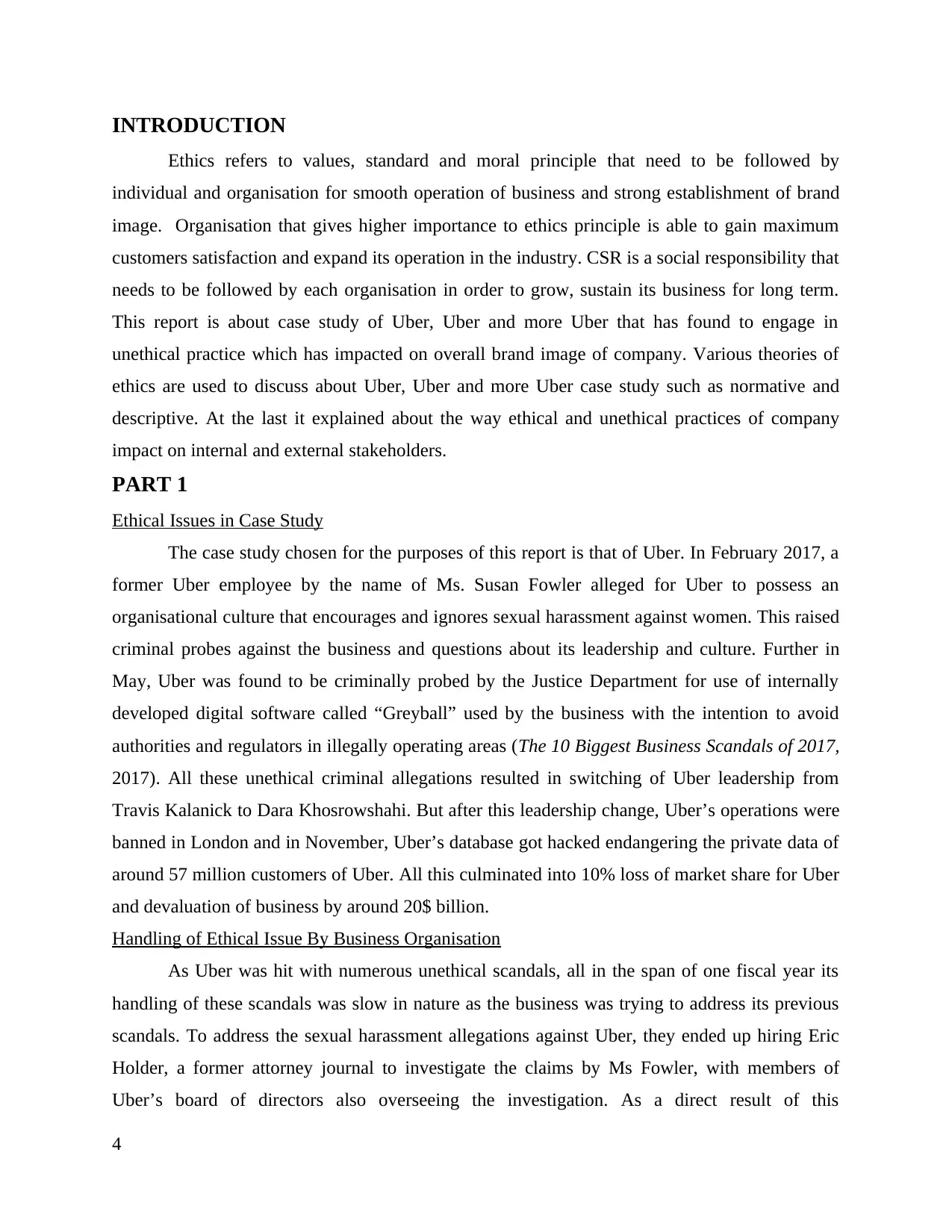
INTRODUCTION
Ethics refers to values, standard and moral principle that need to be followed by
individual and organisation for smooth operation of business and strong establishment of brand
image. Organisation that gives higher importance to ethics principle is able to gain maximum
customers satisfaction and expand its operation in the industry. CSR is a social responsibility that
needs to be followed by each organisation in order to grow, sustain its business for long term.
This report is about case study of Uber, Uber and more Uber that has found to engage in
unethical practice which has impacted on overall brand image of company. Various theories of
ethics are used to discuss about Uber, Uber and more Uber case study such as normative and
descriptive. At the last it explained about the way ethical and unethical practices of company
impact on internal and external stakeholders.
PART 1
Ethical Issues in Case Study
The case study chosen for the purposes of this report is that of Uber. In February 2017, a
former Uber employee by the name of Ms. Susan Fowler alleged for Uber to possess an
organisational culture that encourages and ignores sexual harassment against women. This raised
criminal probes against the business and questions about its leadership and culture. Further in
May, Uber was found to be criminally probed by the Justice Department for use of internally
developed digital software called “Greyball” used by the business with the intention to avoid
authorities and regulators in illegally operating areas (The 10 Biggest Business Scandals of 2017,
2017). All these unethical criminal allegations resulted in switching of Uber leadership from
Travis Kalanick to Dara Khosrowshahi. But after this leadership change, Uber’s operations were
banned in London and in November, Uber’s database got hacked endangering the private data of
around 57 million customers of Uber. All this culminated into 10% loss of market share for Uber
and devaluation of business by around 20$ billion.
Handling of Ethical Issue By Business Organisation
As Uber was hit with numerous unethical scandals, all in the span of one fiscal year its
handling of these scandals was slow in nature as the business was trying to address its previous
scandals. To address the sexual harassment allegations against Uber, they ended up hiring Eric
Holder, a former attorney journal to investigate the claims by Ms Fowler, with members of
Uber’s board of directors also overseeing the investigation. As a direct result of this
4
Ethics refers to values, standard and moral principle that need to be followed by
individual and organisation for smooth operation of business and strong establishment of brand
image. Organisation that gives higher importance to ethics principle is able to gain maximum
customers satisfaction and expand its operation in the industry. CSR is a social responsibility that
needs to be followed by each organisation in order to grow, sustain its business for long term.
This report is about case study of Uber, Uber and more Uber that has found to engage in
unethical practice which has impacted on overall brand image of company. Various theories of
ethics are used to discuss about Uber, Uber and more Uber case study such as normative and
descriptive. At the last it explained about the way ethical and unethical practices of company
impact on internal and external stakeholders.
PART 1
Ethical Issues in Case Study
The case study chosen for the purposes of this report is that of Uber. In February 2017, a
former Uber employee by the name of Ms. Susan Fowler alleged for Uber to possess an
organisational culture that encourages and ignores sexual harassment against women. This raised
criminal probes against the business and questions about its leadership and culture. Further in
May, Uber was found to be criminally probed by the Justice Department for use of internally
developed digital software called “Greyball” used by the business with the intention to avoid
authorities and regulators in illegally operating areas (The 10 Biggest Business Scandals of 2017,
2017). All these unethical criminal allegations resulted in switching of Uber leadership from
Travis Kalanick to Dara Khosrowshahi. But after this leadership change, Uber’s operations were
banned in London and in November, Uber’s database got hacked endangering the private data of
around 57 million customers of Uber. All this culminated into 10% loss of market share for Uber
and devaluation of business by around 20$ billion.
Handling of Ethical Issue By Business Organisation
As Uber was hit with numerous unethical scandals, all in the span of one fiscal year its
handling of these scandals was slow in nature as the business was trying to address its previous
scandals. To address the sexual harassment allegations against Uber, they ended up hiring Eric
Holder, a former attorney journal to investigate the claims by Ms Fowler, with members of
Uber’s board of directors also overseeing the investigation. As a direct result of this
4
Paraphrase This Document
Need a fresh take? Get an instant paraphrase of this document with our AI Paraphraser
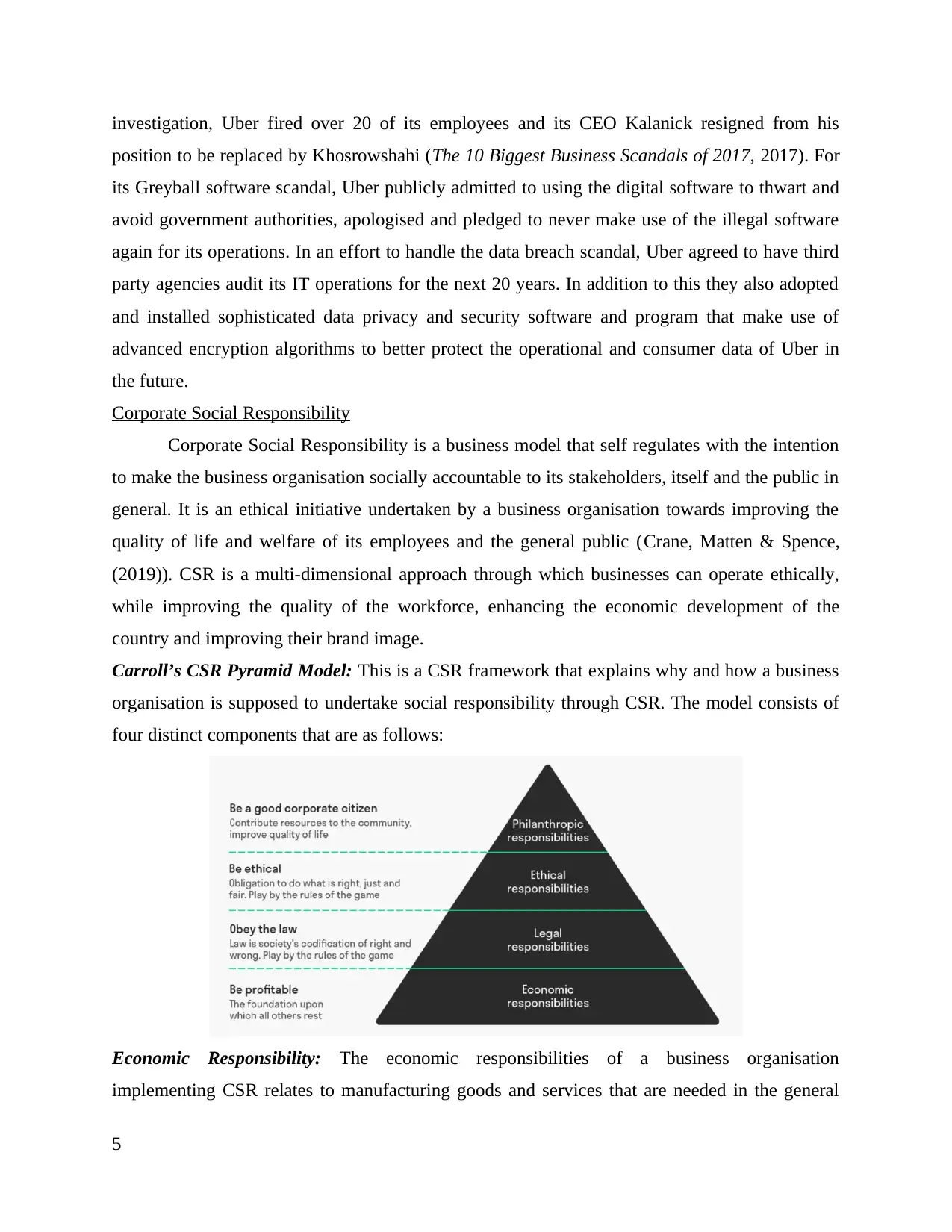
investigation, Uber fired over 20 of its employees and its CEO Kalanick resigned from his
position to be replaced by Khosrowshahi (The 10 Biggest Business Scandals of 2017, 2017). For
its Greyball software scandal, Uber publicly admitted to using the digital software to thwart and
avoid government authorities, apologised and pledged to never make use of the illegal software
again for its operations. In an effort to handle the data breach scandal, Uber agreed to have third
party agencies audit its IT operations for the next 20 years. In addition to this they also adopted
and installed sophisticated data privacy and security software and program that make use of
advanced encryption algorithms to better protect the operational and consumer data of Uber in
the future.
Corporate Social Responsibility
Corporate Social Responsibility is a business model that self regulates with the intention
to make the business organisation socially accountable to its stakeholders, itself and the public in
general. It is an ethical initiative undertaken by a business organisation towards improving the
quality of life and welfare of its employees and the general public (Crane, Matten & Spence,
(2019)). CSR is a multi-dimensional approach through which businesses can operate ethically,
while improving the quality of the workforce, enhancing the economic development of the
country and improving their brand image.
Carroll’s CSR Pyramid Model: This is a CSR framework that explains why and how a business
organisation is supposed to undertake social responsibility through CSR. The model consists of
four distinct components that are as follows:
Economic Responsibility: The economic responsibilities of a business organisation
implementing CSR relates to manufacturing goods and services that are needed in the general
5
position to be replaced by Khosrowshahi (The 10 Biggest Business Scandals of 2017, 2017). For
its Greyball software scandal, Uber publicly admitted to using the digital software to thwart and
avoid government authorities, apologised and pledged to never make use of the illegal software
again for its operations. In an effort to handle the data breach scandal, Uber agreed to have third
party agencies audit its IT operations for the next 20 years. In addition to this they also adopted
and installed sophisticated data privacy and security software and program that make use of
advanced encryption algorithms to better protect the operational and consumer data of Uber in
the future.
Corporate Social Responsibility
Corporate Social Responsibility is a business model that self regulates with the intention
to make the business organisation socially accountable to its stakeholders, itself and the public in
general. It is an ethical initiative undertaken by a business organisation towards improving the
quality of life and welfare of its employees and the general public (Crane, Matten & Spence,
(2019)). CSR is a multi-dimensional approach through which businesses can operate ethically,
while improving the quality of the workforce, enhancing the economic development of the
country and improving their brand image.
Carroll’s CSR Pyramid Model: This is a CSR framework that explains why and how a business
organisation is supposed to undertake social responsibility through CSR. The model consists of
four distinct components that are as follows:
Economic Responsibility: The economic responsibilities of a business organisation
implementing CSR relates to manufacturing goods and services that are needed in the general
5
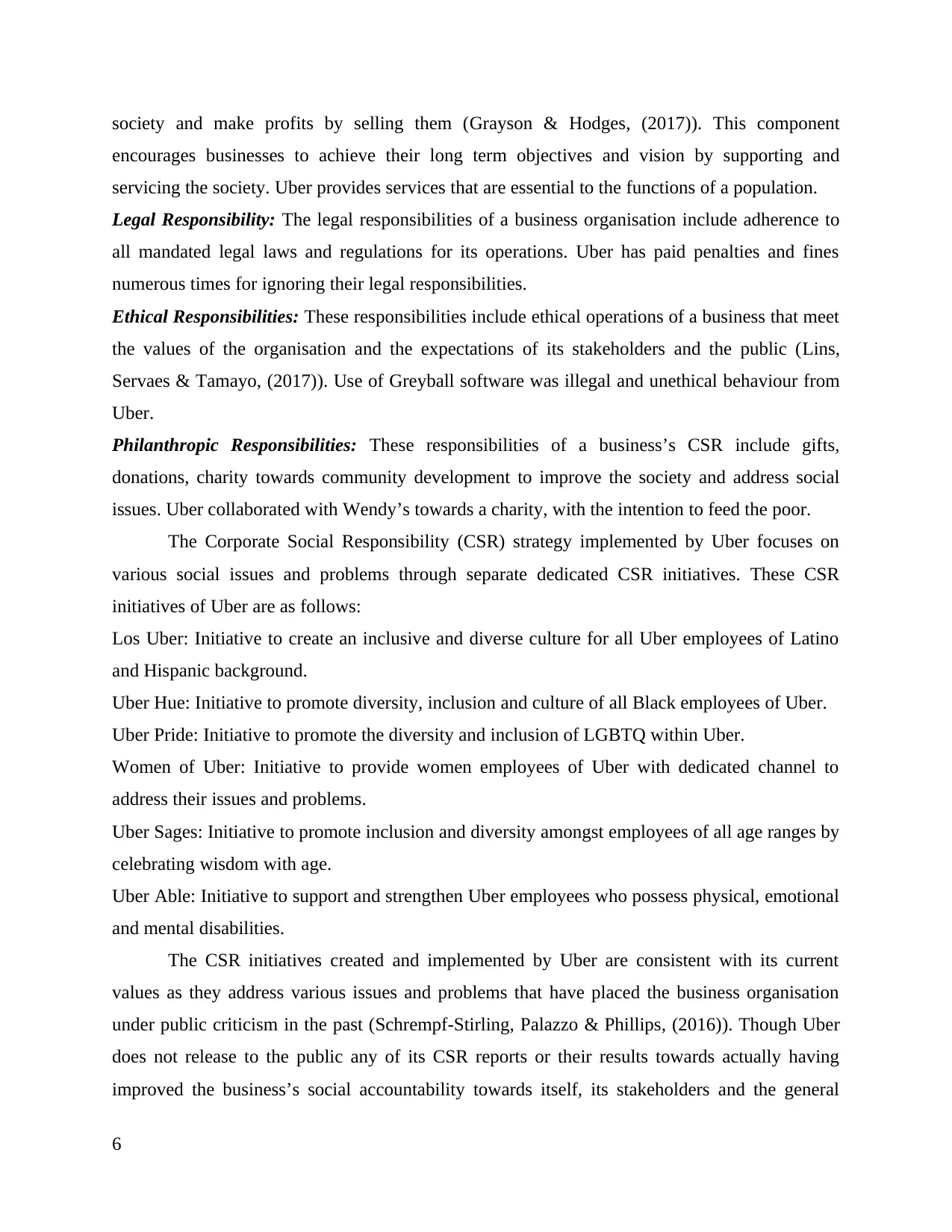
society and make profits by selling them (Grayson & Hodges, (2017)). This component
encourages businesses to achieve their long term objectives and vision by supporting and
servicing the society. Uber provides services that are essential to the functions of a population.
Legal Responsibility: The legal responsibilities of a business organisation include adherence to
all mandated legal laws and regulations for its operations. Uber has paid penalties and fines
numerous times for ignoring their legal responsibilities.
Ethical Responsibilities: These responsibilities include ethical operations of a business that meet
the values of the organisation and the expectations of its stakeholders and the public (Lins,
Servaes & Tamayo, (2017)). Use of Greyball software was illegal and unethical behaviour from
Uber.
Philanthropic Responsibilities: These responsibilities of a business’s CSR include gifts,
donations, charity towards community development to improve the society and address social
issues. Uber collaborated with Wendy’s towards a charity, with the intention to feed the poor.
The Corporate Social Responsibility (CSR) strategy implemented by Uber focuses on
various social issues and problems through separate dedicated CSR initiatives. These CSR
initiatives of Uber are as follows:
Los Uber: Initiative to create an inclusive and diverse culture for all Uber employees of Latino
and Hispanic background.
Uber Hue: Initiative to promote diversity, inclusion and culture of all Black employees of Uber.
Uber Pride: Initiative to promote the diversity and inclusion of LGBTQ within Uber.
Women of Uber: Initiative to provide women employees of Uber with dedicated channel to
address their issues and problems.
Uber Sages: Initiative to promote inclusion and diversity amongst employees of all age ranges by
celebrating wisdom with age.
Uber Able: Initiative to support and strengthen Uber employees who possess physical, emotional
and mental disabilities.
The CSR initiatives created and implemented by Uber are consistent with its current
values as they address various issues and problems that have placed the business organisation
under public criticism in the past (Schrempf-Stirling, Palazzo & Phillips, (2016)). Though Uber
does not release to the public any of its CSR reports or their results towards actually having
improved the business’s social accountability towards itself, its stakeholders and the general
6
encourages businesses to achieve their long term objectives and vision by supporting and
servicing the society. Uber provides services that are essential to the functions of a population.
Legal Responsibility: The legal responsibilities of a business organisation include adherence to
all mandated legal laws and regulations for its operations. Uber has paid penalties and fines
numerous times for ignoring their legal responsibilities.
Ethical Responsibilities: These responsibilities include ethical operations of a business that meet
the values of the organisation and the expectations of its stakeholders and the public (Lins,
Servaes & Tamayo, (2017)). Use of Greyball software was illegal and unethical behaviour from
Uber.
Philanthropic Responsibilities: These responsibilities of a business’s CSR include gifts,
donations, charity towards community development to improve the society and address social
issues. Uber collaborated with Wendy’s towards a charity, with the intention to feed the poor.
The Corporate Social Responsibility (CSR) strategy implemented by Uber focuses on
various social issues and problems through separate dedicated CSR initiatives. These CSR
initiatives of Uber are as follows:
Los Uber: Initiative to create an inclusive and diverse culture for all Uber employees of Latino
and Hispanic background.
Uber Hue: Initiative to promote diversity, inclusion and culture of all Black employees of Uber.
Uber Pride: Initiative to promote the diversity and inclusion of LGBTQ within Uber.
Women of Uber: Initiative to provide women employees of Uber with dedicated channel to
address their issues and problems.
Uber Sages: Initiative to promote inclusion and diversity amongst employees of all age ranges by
celebrating wisdom with age.
Uber Able: Initiative to support and strengthen Uber employees who possess physical, emotional
and mental disabilities.
The CSR initiatives created and implemented by Uber are consistent with its current
values as they address various issues and problems that have placed the business organisation
under public criticism in the past (Schrempf-Stirling, Palazzo & Phillips, (2016)). Though Uber
does not release to the public any of its CSR reports or their results towards actually having
improved the business’s social accountability towards itself, its stakeholders and the general
6
⊘ This is a preview!⊘
Do you want full access?
Subscribe today to unlock all pages.

Trusted by 1+ million students worldwide
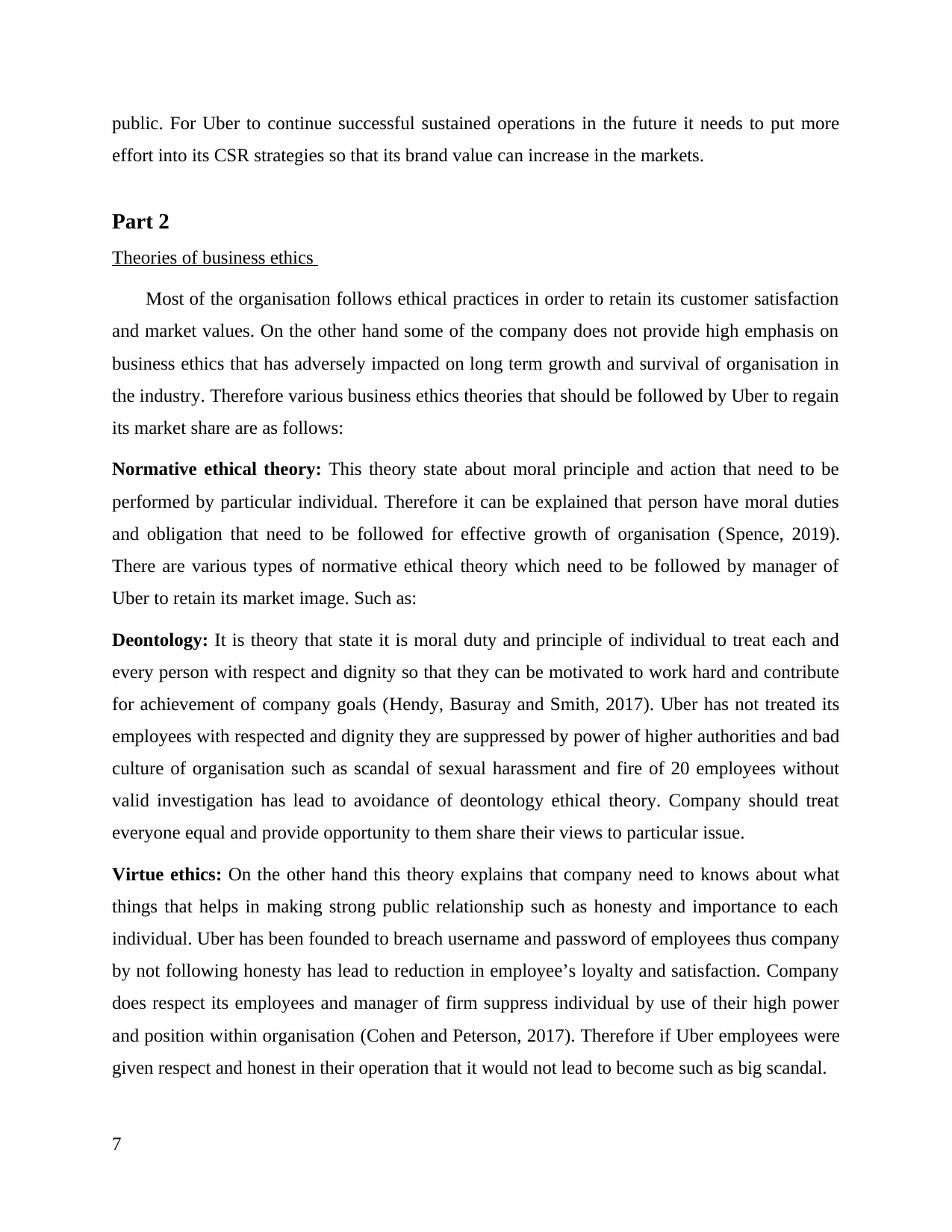
public. For Uber to continue successful sustained operations in the future it needs to put more
effort into its CSR strategies so that its brand value can increase in the markets.
Part 2
Theories of business ethics
Most of the organisation follows ethical practices in order to retain its customer satisfaction
and market values. On the other hand some of the company does not provide high emphasis on
business ethics that has adversely impacted on long term growth and survival of organisation in
the industry. Therefore various business ethics theories that should be followed by Uber to regain
its market share are as follows:
Normative ethical theory: This theory state about moral principle and action that need to be
performed by particular individual. Therefore it can be explained that person have moral duties
and obligation that need to be followed for effective growth of organisation (Spence, 2019).
There are various types of normative ethical theory which need to be followed by manager of
Uber to retain its market image. Such as:
Deontology: It is theory that state it is moral duty and principle of individual to treat each and
every person with respect and dignity so that they can be motivated to work hard and contribute
for achievement of company goals (Hendy, Basuray and Smith, 2017). Uber has not treated its
employees with respected and dignity they are suppressed by power of higher authorities and bad
culture of organisation such as scandal of sexual harassment and fire of 20 employees without
valid investigation has lead to avoidance of deontology ethical theory. Company should treat
everyone equal and provide opportunity to them share their views to particular issue.
Virtue ethics: On the other hand this theory explains that company need to knows about what
things that helps in making strong public relationship such as honesty and importance to each
individual. Uber has been founded to breach username and password of employees thus company
by not following honesty has lead to reduction in employee’s loyalty and satisfaction. Company
does respect its employees and manager of firm suppress individual by use of their high power
and position within organisation (Cohen and Peterson, 2017). Therefore if Uber employees were
given respect and honest in their operation that it would not lead to become such as big scandal.
7
effort into its CSR strategies so that its brand value can increase in the markets.
Part 2
Theories of business ethics
Most of the organisation follows ethical practices in order to retain its customer satisfaction
and market values. On the other hand some of the company does not provide high emphasis on
business ethics that has adversely impacted on long term growth and survival of organisation in
the industry. Therefore various business ethics theories that should be followed by Uber to regain
its market share are as follows:
Normative ethical theory: This theory state about moral principle and action that need to be
performed by particular individual. Therefore it can be explained that person have moral duties
and obligation that need to be followed for effective growth of organisation (Spence, 2019).
There are various types of normative ethical theory which need to be followed by manager of
Uber to retain its market image. Such as:
Deontology: It is theory that state it is moral duty and principle of individual to treat each and
every person with respect and dignity so that they can be motivated to work hard and contribute
for achievement of company goals (Hendy, Basuray and Smith, 2017). Uber has not treated its
employees with respected and dignity they are suppressed by power of higher authorities and bad
culture of organisation such as scandal of sexual harassment and fire of 20 employees without
valid investigation has lead to avoidance of deontology ethical theory. Company should treat
everyone equal and provide opportunity to them share their views to particular issue.
Virtue ethics: On the other hand this theory explains that company need to knows about what
things that helps in making strong public relationship such as honesty and importance to each
individual. Uber has been founded to breach username and password of employees thus company
by not following honesty has lead to reduction in employee’s loyalty and satisfaction. Company
does respect its employees and manager of firm suppress individual by use of their high power
and position within organisation (Cohen and Peterson, 2017). Therefore if Uber employees were
given respect and honest in their operation that it would not lead to become such as big scandal.
7
Paraphrase This Document
Need a fresh take? Get an instant paraphrase of this document with our AI Paraphraser
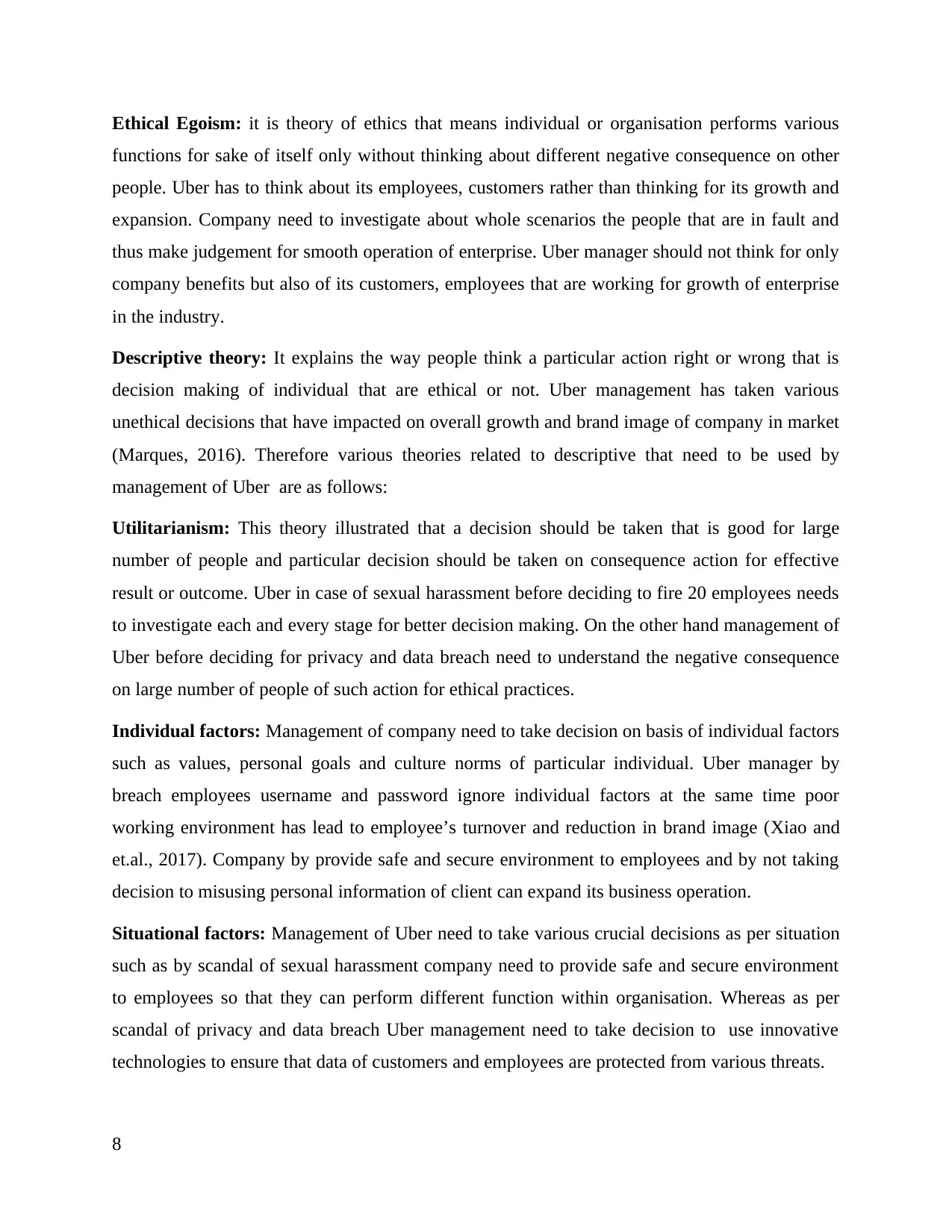
Ethical Egoism: it is theory of ethics that means individual or organisation performs various
functions for sake of itself only without thinking about different negative consequence on other
people. Uber has to think about its employees, customers rather than thinking for its growth and
expansion. Company need to investigate about whole scenarios the people that are in fault and
thus make judgement for smooth operation of enterprise. Uber manager should not think for only
company benefits but also of its customers, employees that are working for growth of enterprise
in the industry.
Descriptive theory: It explains the way people think a particular action right or wrong that is
decision making of individual that are ethical or not. Uber management has taken various
unethical decisions that have impacted on overall growth and brand image of company in market
(Marques, 2016). Therefore various theories related to descriptive that need to be used by
management of Uber are as follows:
Utilitarianism: This theory illustrated that a decision should be taken that is good for large
number of people and particular decision should be taken on consequence action for effective
result or outcome. Uber in case of sexual harassment before deciding to fire 20 employees needs
to investigate each and every stage for better decision making. On the other hand management of
Uber before deciding for privacy and data breach need to understand the negative consequence
on large number of people of such action for ethical practices.
Individual factors: Management of company need to take decision on basis of individual factors
such as values, personal goals and culture norms of particular individual. Uber manager by
breach employees username and password ignore individual factors at the same time poor
working environment has lead to employee’s turnover and reduction in brand image (Xiao and
et.al., 2017). Company by provide safe and secure environment to employees and by not taking
decision to misusing personal information of client can expand its business operation.
Situational factors: Management of Uber need to take various crucial decisions as per situation
such as by scandal of sexual harassment company need to provide safe and secure environment
to employees so that they can perform different function within organisation. Whereas as per
scandal of privacy and data breach Uber management need to take decision to use innovative
technologies to ensure that data of customers and employees are protected from various threats.
8
functions for sake of itself only without thinking about different negative consequence on other
people. Uber has to think about its employees, customers rather than thinking for its growth and
expansion. Company need to investigate about whole scenarios the people that are in fault and
thus make judgement for smooth operation of enterprise. Uber manager should not think for only
company benefits but also of its customers, employees that are working for growth of enterprise
in the industry.
Descriptive theory: It explains the way people think a particular action right or wrong that is
decision making of individual that are ethical or not. Uber management has taken various
unethical decisions that have impacted on overall growth and brand image of company in market
(Marques, 2016). Therefore various theories related to descriptive that need to be used by
management of Uber are as follows:
Utilitarianism: This theory illustrated that a decision should be taken that is good for large
number of people and particular decision should be taken on consequence action for effective
result or outcome. Uber in case of sexual harassment before deciding to fire 20 employees needs
to investigate each and every stage for better decision making. On the other hand management of
Uber before deciding for privacy and data breach need to understand the negative consequence
on large number of people of such action for ethical practices.
Individual factors: Management of company need to take decision on basis of individual factors
such as values, personal goals and culture norms of particular individual. Uber manager by
breach employees username and password ignore individual factors at the same time poor
working environment has lead to employee’s turnover and reduction in brand image (Xiao and
et.al., 2017). Company by provide safe and secure environment to employees and by not taking
decision to misusing personal information of client can expand its business operation.
Situational factors: Management of Uber need to take various crucial decisions as per situation
such as by scandal of sexual harassment company need to provide safe and secure environment
to employees so that they can perform different function within organisation. Whereas as per
scandal of privacy and data breach Uber management need to take decision to use innovative
technologies to ensure that data of customers and employees are protected from various threats.
8
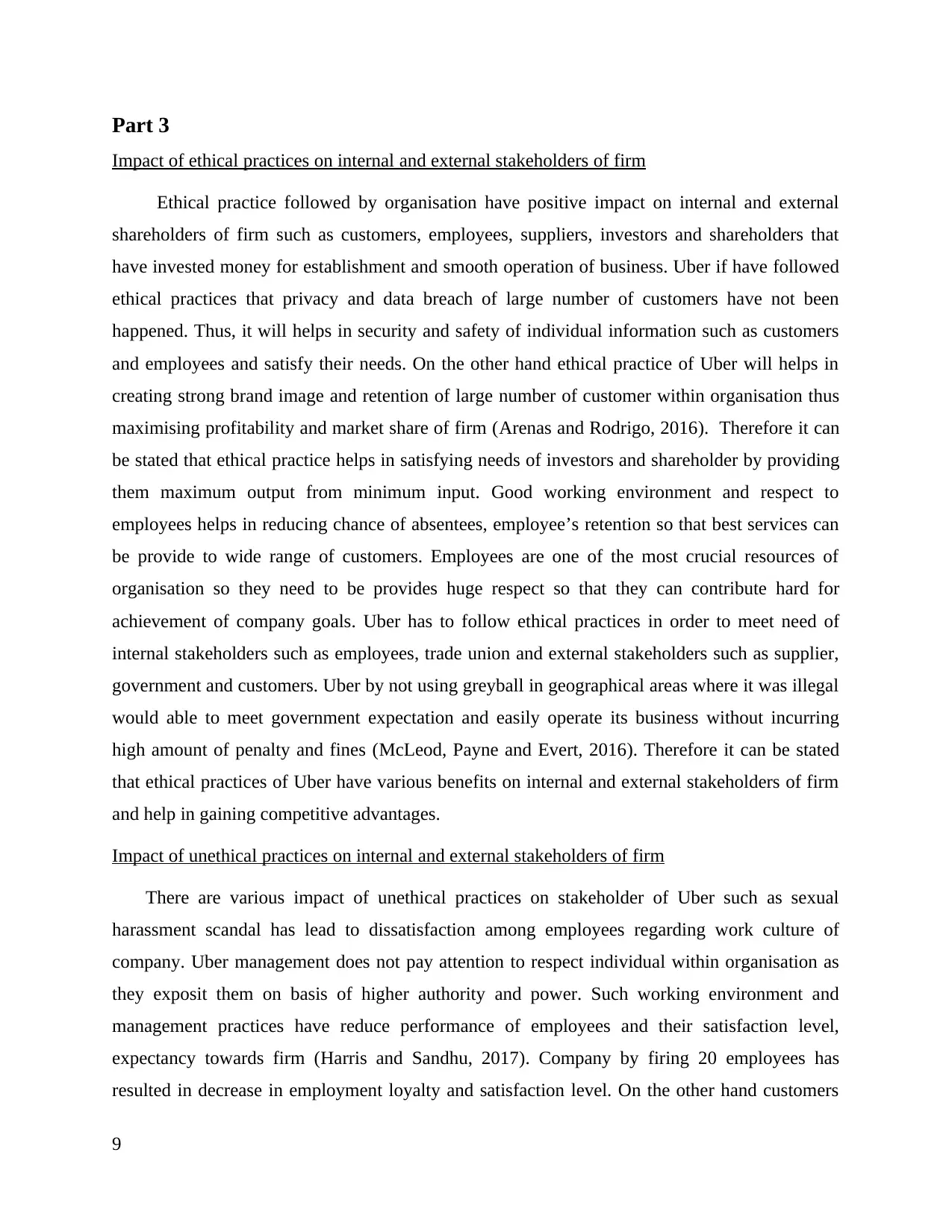
Part 3
Impact of ethical practices on internal and external stakeholders of firm
Ethical practice followed by organisation have positive impact on internal and external
shareholders of firm such as customers, employees, suppliers, investors and shareholders that
have invested money for establishment and smooth operation of business. Uber if have followed
ethical practices that privacy and data breach of large number of customers have not been
happened. Thus, it will helps in security and safety of individual information such as customers
and employees and satisfy their needs. On the other hand ethical practice of Uber will helps in
creating strong brand image and retention of large number of customer within organisation thus
maximising profitability and market share of firm (Arenas and Rodrigo, 2016). Therefore it can
be stated that ethical practice helps in satisfying needs of investors and shareholder by providing
them maximum output from minimum input. Good working environment and respect to
employees helps in reducing chance of absentees, employee’s retention so that best services can
be provide to wide range of customers. Employees are one of the most crucial resources of
organisation so they need to be provides huge respect so that they can contribute hard for
achievement of company goals. Uber has to follow ethical practices in order to meet need of
internal stakeholders such as employees, trade union and external stakeholders such as supplier,
government and customers. Uber by not using greyball in geographical areas where it was illegal
would able to meet government expectation and easily operate its business without incurring
high amount of penalty and fines (McLeod, Payne and Evert, 2016). Therefore it can be stated
that ethical practices of Uber have various benefits on internal and external stakeholders of firm
and help in gaining competitive advantages.
Impact of unethical practices on internal and external stakeholders of firm
There are various impact of unethical practices on stakeholder of Uber such as sexual
harassment scandal has lead to dissatisfaction among employees regarding work culture of
company. Uber management does not pay attention to respect individual within organisation as
they exposit them on basis of higher authority and power. Such working environment and
management practices have reduce performance of employees and their satisfaction level,
expectancy towards firm (Harris and Sandhu, 2017). Company by firing 20 employees has
resulted in decrease in employment loyalty and satisfaction level. On the other hand customers
9
Impact of ethical practices on internal and external stakeholders of firm
Ethical practice followed by organisation have positive impact on internal and external
shareholders of firm such as customers, employees, suppliers, investors and shareholders that
have invested money for establishment and smooth operation of business. Uber if have followed
ethical practices that privacy and data breach of large number of customers have not been
happened. Thus, it will helps in security and safety of individual information such as customers
and employees and satisfy their needs. On the other hand ethical practice of Uber will helps in
creating strong brand image and retention of large number of customer within organisation thus
maximising profitability and market share of firm (Arenas and Rodrigo, 2016). Therefore it can
be stated that ethical practice helps in satisfying needs of investors and shareholder by providing
them maximum output from minimum input. Good working environment and respect to
employees helps in reducing chance of absentees, employee’s retention so that best services can
be provide to wide range of customers. Employees are one of the most crucial resources of
organisation so they need to be provides huge respect so that they can contribute hard for
achievement of company goals. Uber has to follow ethical practices in order to meet need of
internal stakeholders such as employees, trade union and external stakeholders such as supplier,
government and customers. Uber by not using greyball in geographical areas where it was illegal
would able to meet government expectation and easily operate its business without incurring
high amount of penalty and fines (McLeod, Payne and Evert, 2016). Therefore it can be stated
that ethical practices of Uber have various benefits on internal and external stakeholders of firm
and help in gaining competitive advantages.
Impact of unethical practices on internal and external stakeholders of firm
There are various impact of unethical practices on stakeholder of Uber such as sexual
harassment scandal has lead to dissatisfaction among employees regarding work culture of
company. Uber management does not pay attention to respect individual within organisation as
they exposit them on basis of higher authority and power. Such working environment and
management practices have reduce performance of employees and their satisfaction level,
expectancy towards firm (Harris and Sandhu, 2017). Company by firing 20 employees has
resulted in decrease in employment loyalty and satisfaction level. On the other hand customers
9
⊘ This is a preview!⊘
Do you want full access?
Subscribe today to unlock all pages.

Trusted by 1+ million students worldwide
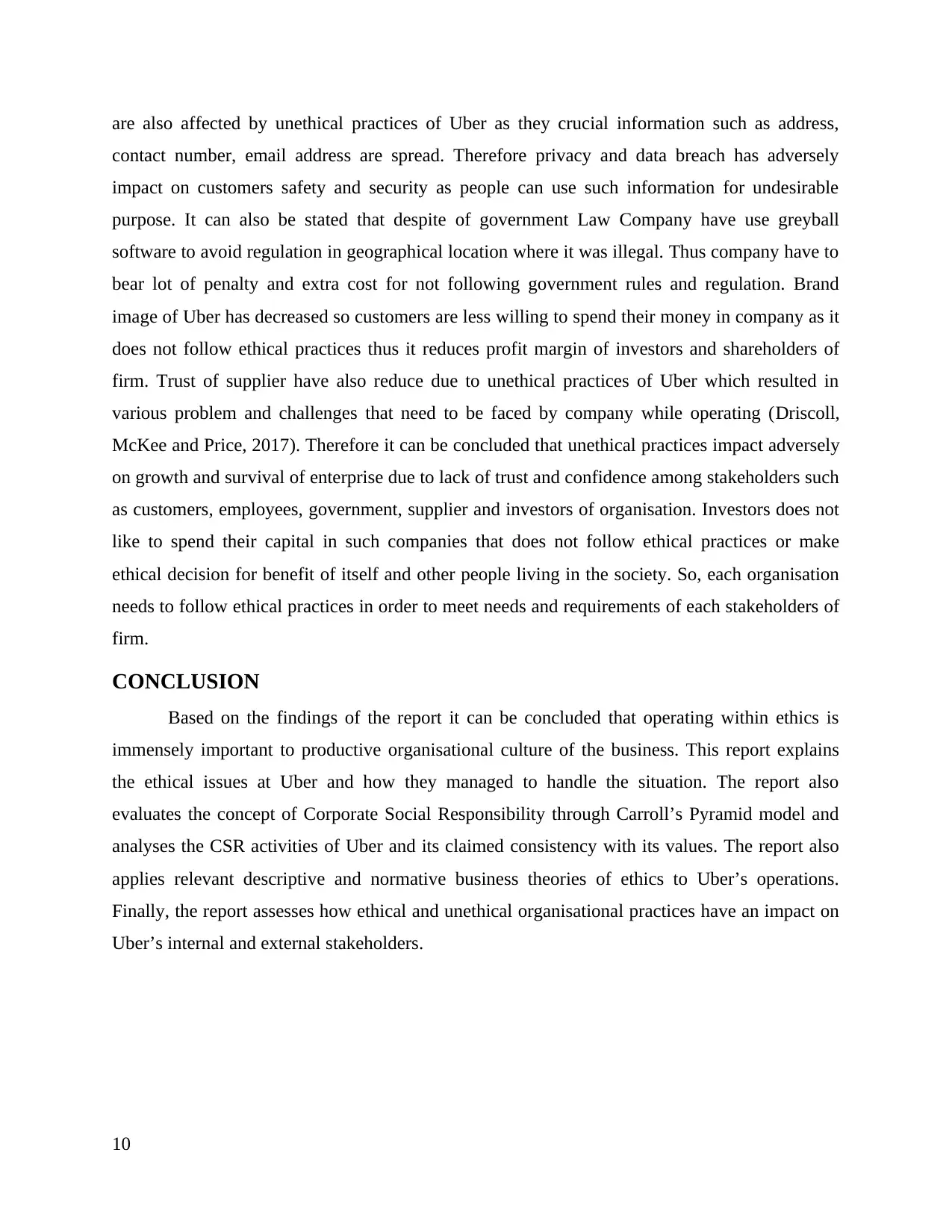
are also affected by unethical practices of Uber as they crucial information such as address,
contact number, email address are spread. Therefore privacy and data breach has adversely
impact on customers safety and security as people can use such information for undesirable
purpose. It can also be stated that despite of government Law Company have use greyball
software to avoid regulation in geographical location where it was illegal. Thus company have to
bear lot of penalty and extra cost for not following government rules and regulation. Brand
image of Uber has decreased so customers are less willing to spend their money in company as it
does not follow ethical practices thus it reduces profit margin of investors and shareholders of
firm. Trust of supplier have also reduce due to unethical practices of Uber which resulted in
various problem and challenges that need to be faced by company while operating (Driscoll,
McKee and Price, 2017). Therefore it can be concluded that unethical practices impact adversely
on growth and survival of enterprise due to lack of trust and confidence among stakeholders such
as customers, employees, government, supplier and investors of organisation. Investors does not
like to spend their capital in such companies that does not follow ethical practices or make
ethical decision for benefit of itself and other people living in the society. So, each organisation
needs to follow ethical practices in order to meet needs and requirements of each stakeholders of
firm.
CONCLUSION
Based on the findings of the report it can be concluded that operating within ethics is
immensely important to productive organisational culture of the business. This report explains
the ethical issues at Uber and how they managed to handle the situation. The report also
evaluates the concept of Corporate Social Responsibility through Carroll’s Pyramid model and
analyses the CSR activities of Uber and its claimed consistency with its values. The report also
applies relevant descriptive and normative business theories of ethics to Uber’s operations.
Finally, the report assesses how ethical and unethical organisational practices have an impact on
Uber’s internal and external stakeholders.
10
contact number, email address are spread. Therefore privacy and data breach has adversely
impact on customers safety and security as people can use such information for undesirable
purpose. It can also be stated that despite of government Law Company have use greyball
software to avoid regulation in geographical location where it was illegal. Thus company have to
bear lot of penalty and extra cost for not following government rules and regulation. Brand
image of Uber has decreased so customers are less willing to spend their money in company as it
does not follow ethical practices thus it reduces profit margin of investors and shareholders of
firm. Trust of supplier have also reduce due to unethical practices of Uber which resulted in
various problem and challenges that need to be faced by company while operating (Driscoll,
McKee and Price, 2017). Therefore it can be concluded that unethical practices impact adversely
on growth and survival of enterprise due to lack of trust and confidence among stakeholders such
as customers, employees, government, supplier and investors of organisation. Investors does not
like to spend their capital in such companies that does not follow ethical practices or make
ethical decision for benefit of itself and other people living in the society. So, each organisation
needs to follow ethical practices in order to meet needs and requirements of each stakeholders of
firm.
CONCLUSION
Based on the findings of the report it can be concluded that operating within ethics is
immensely important to productive organisational culture of the business. This report explains
the ethical issues at Uber and how they managed to handle the situation. The report also
evaluates the concept of Corporate Social Responsibility through Carroll’s Pyramid model and
analyses the CSR activities of Uber and its claimed consistency with its values. The report also
applies relevant descriptive and normative business theories of ethics to Uber’s operations.
Finally, the report assesses how ethical and unethical organisational practices have an impact on
Uber’s internal and external stakeholders.
10
Paraphrase This Document
Need a fresh take? Get an instant paraphrase of this document with our AI Paraphraser
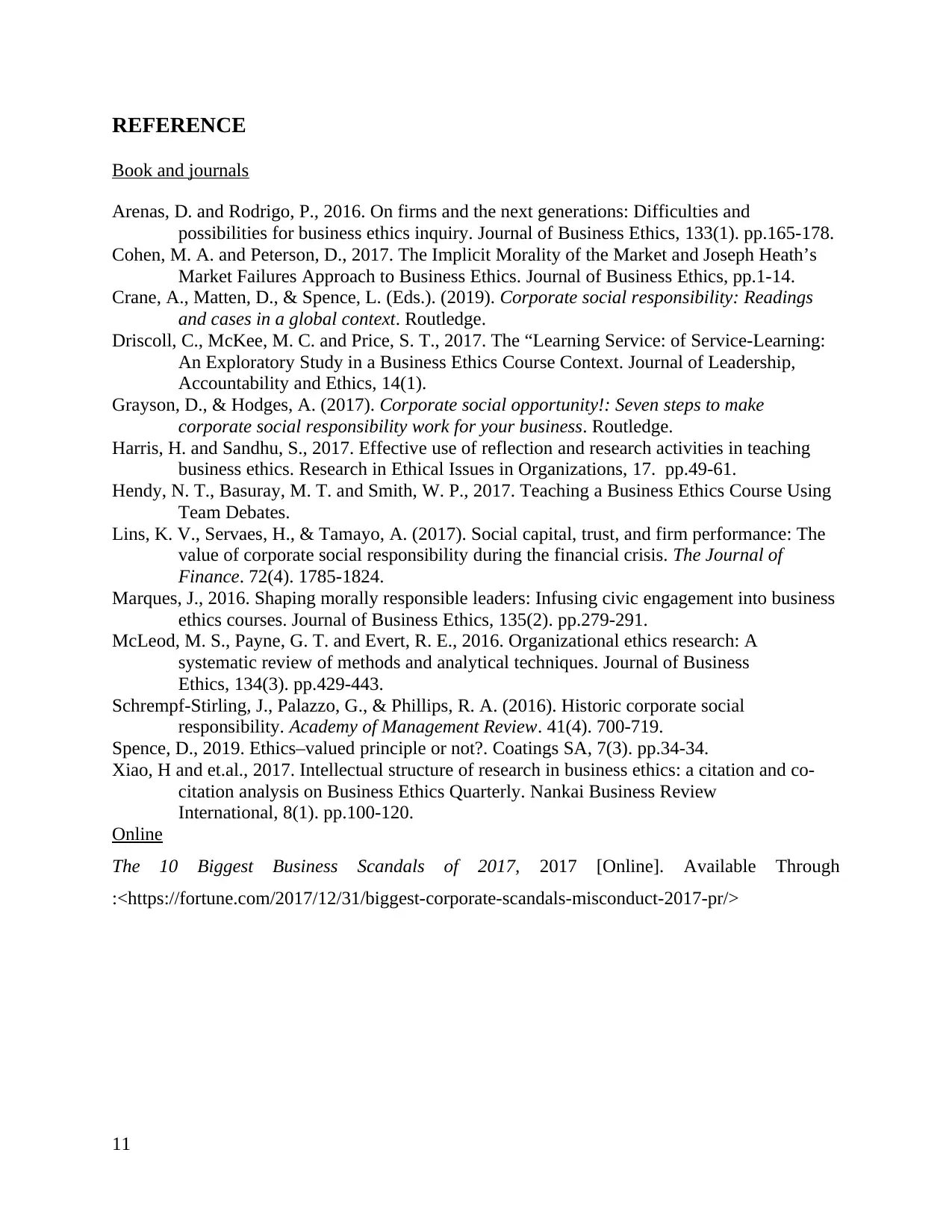
REFERENCE
Book and journals
Arenas, D. and Rodrigo, P., 2016. On firms and the next generations: Difficulties and
possibilities for business ethics inquiry. Journal of Business Ethics, 133(1). pp.165-178.
Cohen, M. A. and Peterson, D., 2017. The Implicit Morality of the Market and Joseph Heath’s
Market Failures Approach to Business Ethics. Journal of Business Ethics, pp.1-14.
Crane, A., Matten, D., & Spence, L. (Eds.). (2019). Corporate social responsibility: Readings
and cases in a global context. Routledge.
Driscoll, C., McKee, M. C. and Price, S. T., 2017. The “Learning Service: of Service-Learning:
An Exploratory Study in a Business Ethics Course Context. Journal of Leadership,
Accountability and Ethics, 14(1).
Grayson, D., & Hodges, A. (2017). Corporate social opportunity!: Seven steps to make
corporate social responsibility work for your business. Routledge.
Harris, H. and Sandhu, S., 2017. Effective use of reflection and research activities in teaching
business ethics. Research in Ethical Issues in Organizations, 17. pp.49-61.
Hendy, N. T., Basuray, M. T. and Smith, W. P., 2017. Teaching a Business Ethics Course Using
Team Debates.
Lins, K. V., Servaes, H., & Tamayo, A. (2017). Social capital, trust, and firm performance: The
value of corporate social responsibility during the financial crisis. The Journal of
Finance. 72(4). 1785-1824.
Marques, J., 2016. Shaping morally responsible leaders: Infusing civic engagement into business
ethics courses. Journal of Business Ethics, 135(2). pp.279-291.
McLeod, M. S., Payne, G. T. and Evert, R. E., 2016. Organizational ethics research: A
systematic review of methods and analytical techniques. Journal of Business
Ethics, 134(3). pp.429-443.
Schrempf-Stirling, J., Palazzo, G., & Phillips, R. A. (2016). Historic corporate social
responsibility. Academy of Management Review. 41(4). 700-719.
Spence, D., 2019. Ethics–valued principle or not?. Coatings SA, 7(3). pp.34-34.
Xiao, H and et.al., 2017. Intellectual structure of research in business ethics: a citation and co-
citation analysis on Business Ethics Quarterly. Nankai Business Review
International, 8(1). pp.100-120.
Online
The 10 Biggest Business Scandals of 2017, 2017 [Online]. Available Through
:<https://fortune.com/2017/12/31/biggest-corporate-scandals-misconduct-2017-pr/>
11
Book and journals
Arenas, D. and Rodrigo, P., 2016. On firms and the next generations: Difficulties and
possibilities for business ethics inquiry. Journal of Business Ethics, 133(1). pp.165-178.
Cohen, M. A. and Peterson, D., 2017. The Implicit Morality of the Market and Joseph Heath’s
Market Failures Approach to Business Ethics. Journal of Business Ethics, pp.1-14.
Crane, A., Matten, D., & Spence, L. (Eds.). (2019). Corporate social responsibility: Readings
and cases in a global context. Routledge.
Driscoll, C., McKee, M. C. and Price, S. T., 2017. The “Learning Service: of Service-Learning:
An Exploratory Study in a Business Ethics Course Context. Journal of Leadership,
Accountability and Ethics, 14(1).
Grayson, D., & Hodges, A. (2017). Corporate social opportunity!: Seven steps to make
corporate social responsibility work for your business. Routledge.
Harris, H. and Sandhu, S., 2017. Effective use of reflection and research activities in teaching
business ethics. Research in Ethical Issues in Organizations, 17. pp.49-61.
Hendy, N. T., Basuray, M. T. and Smith, W. P., 2017. Teaching a Business Ethics Course Using
Team Debates.
Lins, K. V., Servaes, H., & Tamayo, A. (2017). Social capital, trust, and firm performance: The
value of corporate social responsibility during the financial crisis. The Journal of
Finance. 72(4). 1785-1824.
Marques, J., 2016. Shaping morally responsible leaders: Infusing civic engagement into business
ethics courses. Journal of Business Ethics, 135(2). pp.279-291.
McLeod, M. S., Payne, G. T. and Evert, R. E., 2016. Organizational ethics research: A
systematic review of methods and analytical techniques. Journal of Business
Ethics, 134(3). pp.429-443.
Schrempf-Stirling, J., Palazzo, G., & Phillips, R. A. (2016). Historic corporate social
responsibility. Academy of Management Review. 41(4). 700-719.
Spence, D., 2019. Ethics–valued principle or not?. Coatings SA, 7(3). pp.34-34.
Xiao, H and et.al., 2017. Intellectual structure of research in business ethics: a citation and co-
citation analysis on Business Ethics Quarterly. Nankai Business Review
International, 8(1). pp.100-120.
Online
The 10 Biggest Business Scandals of 2017, 2017 [Online]. Available Through
:<https://fortune.com/2017/12/31/biggest-corporate-scandals-misconduct-2017-pr/>
11
1 out of 11
Related Documents
Your All-in-One AI-Powered Toolkit for Academic Success.
+13062052269
info@desklib.com
Available 24*7 on WhatsApp / Email
![[object Object]](/_next/static/media/star-bottom.7253800d.svg)
Unlock your academic potential
Copyright © 2020–2026 A2Z Services. All Rights Reserved. Developed and managed by ZUCOL.





